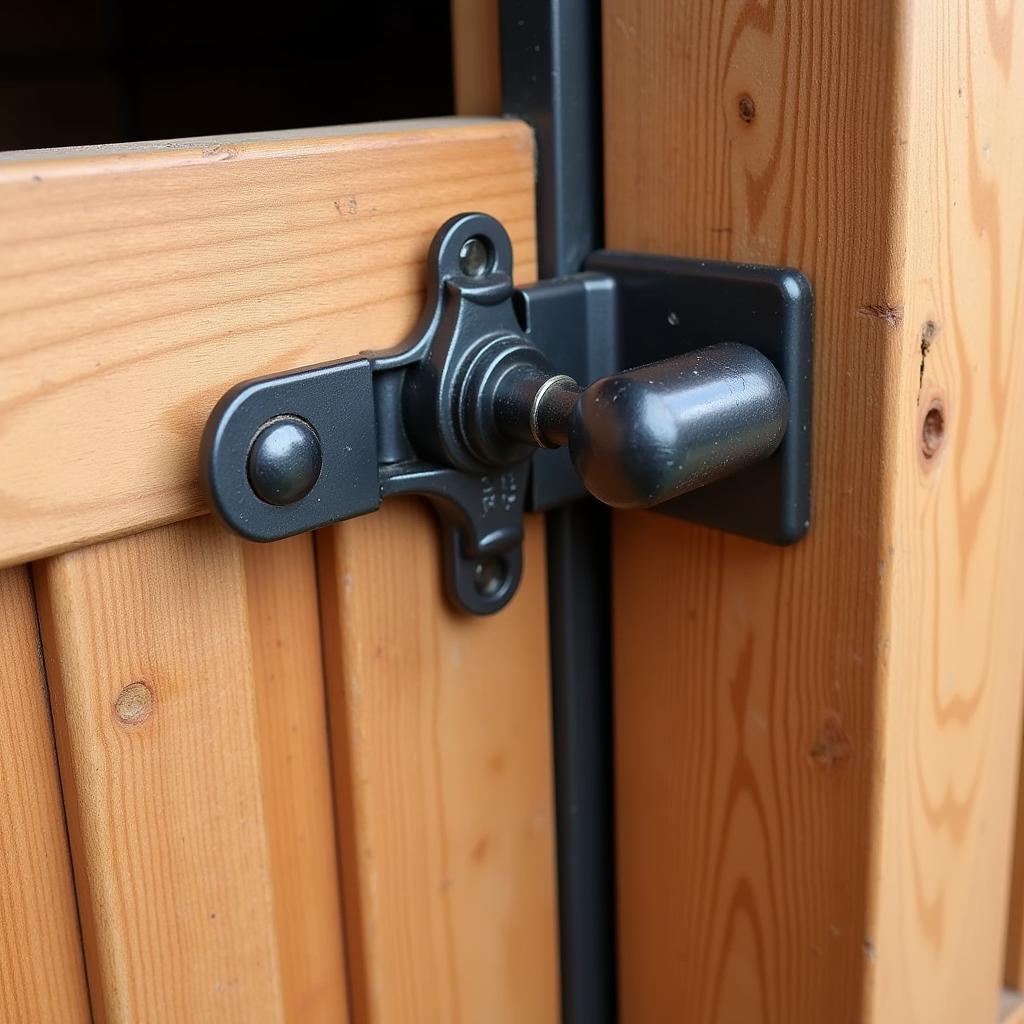Selecting the right gate latches might seem like a minor detail in the grand scheme of horse ownership, but it can have a significant impact on your horse’s safety and the overall security of your stable. A poorly designed or faulty latch can lead to escapes, injuries, and a whole lot of headaches for horse owners. This comprehensive guide will delve into the world of gate latches, equipping you with the knowledge to make informed decisions for your equine companions.
Types of Gate Latches for Horses
The market offers a wide array of gate latches, each with its own set of advantages and disadvantages. Let’s explore some of the most common types:
1. Bolt Latches
Bolt latches are a simple yet effective option for horse gates. They consist of a metal bolt that slides into a keeper, securing the gate in place.
Pros:
- Affordable: Bolt latches are generally the most budget-friendly option.
- Easy to install: They require minimal effort to install, often needing just a few screws.
- Durable: When properly maintained, bolt latches can withstand years of use.
Cons:
- Manual operation: You need to manually slide the bolt to open and close the gate, which can be inconvenient.
- Can be difficult to operate with one hand: This can be challenging if you are leading a horse or carrying equipment.
2. Spring Latches
Spring latches are a popular choice for horse gates due to their self-closing mechanism.
Pros:
- Convenience: The spring-loaded design automatically latches the gate behind you, providing peace of mind.
- Easy one-handed operation: You can open most spring latches with a single hand, which is particularly helpful when handling horses.
Cons:
- Can be less secure: Determined horses may learn to manipulate the spring mechanism and escape.
- Prone to rust: The spring component can be susceptible to rust, especially in humid environments.
3. Barrel Bolt Latches
Barrel bolt latches offer a simple yet robust solution, commonly found on barn doors and gates.
Pros:
- Durable and long-lasting: Their simple, sturdy design makes them resistant to wear and tear.
- Difficult for horses to open: The sliding bolt mechanism is challenging for horses to manipulate.
Cons:
- Requires two-handed operation: You need both hands to operate the latch, which can be inconvenient.
- Not as readily available: Barrel bolt latches designed specifically for horse gates might be harder to find.
 Barrel Bolt Latch on Wooden Gate
Barrel Bolt Latch on Wooden Gate
4. Chain Latches
Chain latches offer a versatile and adjustable option for horse gates.
Pros:
- Adjustable length: You can adjust the chain length to accommodate gates of varying heights.
- Can be used as a secondary latch: Provides an extra layer of security when used in conjunction with another latch type.
Cons:
- Can be noisy: The metal chain can rattle against the gate, potentially spooking horses.
- Less secure as a primary latch: A determined horse might be able to disengage the chain.
5. Keyed Latches
For an added layer of security, consider keyed latches.
Pros:
- Enhanced security: Prevents unauthorized access to pastures or stables.
- Peace of mind: Provides an extra level of assurance that your horses are safely contained.
Cons:
- Higher cost: Keyed latches are typically more expensive than other types.
- Key management: Losing the key can be a major inconvenience.
Factors to Consider When Choosing Gate Latches
Selecting the appropriate gate latches for your horses involves considering several crucial factors:
-
Horse Temperament: Evaluate your horse’s personality and habits. A curious or determined horse might require a more secure latch than a docile one.
“Understanding your horse’s individual personality is paramount when choosing gate latches,” says renowned equine behaviorist Dr. Sarah Williams. “A horse known for testing boundaries will necessitate a more robust and escape-proof latching mechanism.”
-
Gate Material and Location: The material and location of your gate will influence the type of latch that’s most suitable. For instance, a heavy wooden gate might require a more heavy-duty latch than a lightweight vinyl gate.
-
Ease of Use: Opt for latches that you can easily operate with one hand, especially when handling horses.
-
Durability and Weather Resistance: Choose latches constructed from durable materials like stainless steel or galvanized steel to prevent rust and corrosion.
-
Budget: Gate latches come in a wide range of prices. Determine your budget and prioritize quality and functionality over the cheapest option.
Conclusion
Selecting the right gate latches is an essential aspect of responsible horse ownership. By carefully considering your horse’s temperament, the gate’s characteristics, and your own needs, you can make an informed decision that ensures your horse’s safety and your peace of mind. Remember to regularly inspect and maintain your latches to ensure they are functioning correctly, preventing potential hazards and escape attempts.
For expert advice on choosing the perfect gate latches for your equine companions, feel free to reach out to us at Justus Horses USA. Contact us at Phone Number: 0772127271, Email: [email protected]. Or visit us at QGM2+WX2, Vị Trung, Vị Thuỷ, Hậu Giang, Việt Nam. Our dedicated team is available 24/7 to assist you with all your horse care needs.